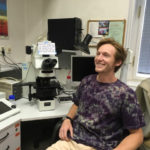
More photos of this internship may be found here.
Set in the heart of Prague, our partner is the oldest, largest, and most prestigious university in the Czech Republic. The university is composed of 17 different faculties and 50,000 students enrolled in more than 300 accredited degree programs. The university’s central location provides an unbeatable opportunity for visiting students to take full advantage of the culture and lifestyle that is uniquely Prague.
The Department of Experimental Plant Biology at our partner university in Prague invites interns to join current research projects in the fields of molecular and cellular biology. Interns will apply their classroom knowledge to and build professional connections with researchers in the field.
The Department of Experimental Plant Biology (or Department of Plant Physiology) of the Faculty of Science has a long and proud tradition. As a direct successor of the former Institute of Plant Anatomy and Physiology founded by Professor Nemec at the end of the 19th century, the department has a rich academic heritage. It is the oldest educational institution of its kind in the Czech Republic and Slovakia.
The dual focuses of the department, teaching and research, reflect current methods and global trends. The department contributes to global plant science through the publication of numerous papers every year, including articles in nature and science. The department also has a number of bilateral research agreements and grant projects in partnership with international institutions such as Oregon State University.
Interns have the opportunity to join a research team for the summer within the Department of Experimental Plant Biology. Projects and tasks may include:
Interns from any relevant science background are encouraged to apply. A strong foundation in cellular biology is preferred, but any prior coursework in biology, cellular biology, and plant biology is helpful. Ideal candidates will be familiar with cell biology (not necessarily plant biology).
Ideal candidates will have experience in DNA manipulation and microscopy.
Interns are encouraged to live in student housing on-campus. Depending on the building and availability, interns may choose from single, double, triple, or quadruple rooms with a shared bathroom. Past interns have recommended the Kolej Budech hall that is close to the lab, city center, and metro stations.
5 Tips for Future Interns in Prague– From adapting to relaxed workplace dynamics and navigating world-class public transit to staying alert about safety, embracing local foods, and adjusting to different social norms, this reflection offers insight into making the most of an internship in the Czech Republic.
"Don’t fight for what you’re used to—embrace what is in front of you instead."
— Ema, Oregon State University
“I have gained a lot of benefits from this internship. Professionally, I was able to do a hands-on experiment of new procedures I have not done before and got a deeper understanding of how the plant cell and exocyst complex work. New lab techniques I learned include: western blot, co-immunoprecipitation, Agrobacterium infiltration, SDS-page vertical gel and how to analyze the outcome of these procedures. This experience has given me a deep understanding of molecular biology and biochemistry experiments. I was also to develop my interpersonal communication skills and learned how to work in a very diverse lab setting. Personally, the most benefit of my internship was I have learned how to manage my time, how to budget and be more social. As I was living by myself for the first time, I learned a lot about financial responsibility.”
-Meron, University of Washington
“I was basically responsible for three different unrelated projects assigned by three different faculty members. The most time consuming of the three is the induction of zoosporogenesis in eleven different yellow-green algae species. This requires several hours of microscope work per day, as well as further analytical methods such as western blots. The other two projects are done in between this larger project. They involve genotyping of Arabidopsis mutants, and searching for the releasing of male sex cells in a macroalgal species called chara under a microscope.”
-Sean, Oregon State University
“This internship is not like any other study abroad experience that I have heard of. IE3 is unique because it gives you an opportunity to learn valuable skills that pertain to your future plans as well as getting the experience of being abroad. I must say that this experience is even unique in terms of IE3 programs. There was only one position available in the lab and typically the intern that is awarded this position is the only American student in the lab. It forces you to immerse yourself into the culture which is cool but also scary.
I really had no idea what I would be doing in the lab aside from helping with research on the exocyst in plants. It has been really interesting to see how the lab runs and how all the students have their own research projects. I ended up doing experiments – I transformed competent E. coli with several different DNA lines, made my own competent cells (which just means that they easily accept DNA), worked with Geneious to design primers, extracted DNA, and subjected the restricted DNA to electrophoresis to verify that we had correctly transformed the DNA into E. coli. This is all so cool to me. I had learned about it all in school, but never actually applied it in real life. This has been truly amazing and I have learned so much.”
-Patrick, University of Oregon
Field Notes Postings:
Summer:
- Graduate and undergraduate students with a solid foundation in cellular biology
- Background in biology, cellular biology, plant biology, science or related majors
- Experience in DNA manipulation and microscopy preferred